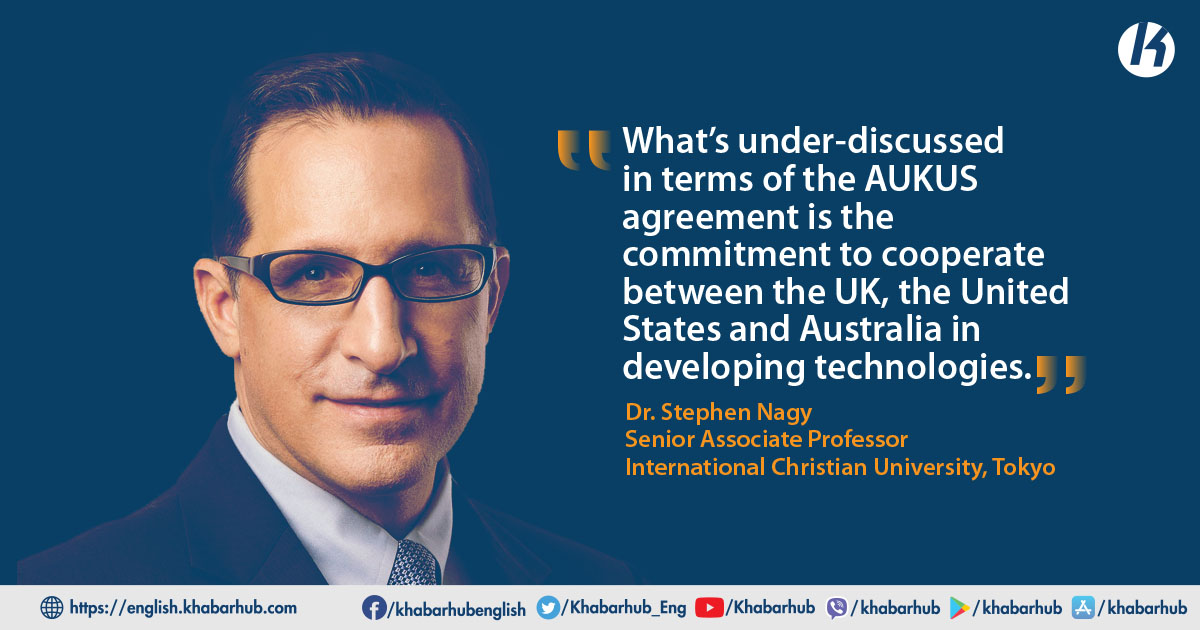Dr. Stephen Nagy is a Senior Associate Professor at the International Christian University in Tokyo, a Fellow at the Canadian Global Affairs Institute (CGAI) and a visiting fellow with the Japan Institute for International Affairs (JIIA).
His recent funded research projects are “Sino-Japanese Relations in the Wake of the 2012 Territorial Disputes: Investigating changes in Japanese Business’ trade and investment strategy in China”, and “Perceptions and drivers of Chinese view on Japanese and US Foreign Policy in the Region”.
He is currently working on middle power approaches to great power competition in the Indo-Pacific. His latest publications include: “Indo-Pacific Resilience, Prosperity and Stability: Canada’s Capabilities-led Approach to Strategic Free and Open Indo-Pacific Engagement,” in Canadian and Japanese FOIP Visions. Policy Perspectives, Canadian Global Affairs Institute; “Sino-Japanese Reactive Diplomacy as seen through the Interplay of the Belt and Road Initiative (BRI) and the Free and Open Indo-Pacific Vision (FOIP).” “Quad-Plus?
Carving out Canada’s Middle Power Role,” Journal of Indo-Pacific Affairs. Special Issue. Quad Plus: Form versus Substance.
Dr. Pramod Jaiswal, Strategic Affairs Editor at Khabarhub, spoke to Dr. Stephen R Nagy on issues related to QUAD, AUKUS and East Asian Security.
How do you assess the recent AUKUS partnership? Will the international alignment complement Quad in the Indo-Pacific or would it diminish the importance of the Quad since it is far more overt in its mission?
Thank you for having me. It’s a great pleasure to speak to you and share some of my views.
I think AUKUS is a really substantial agreement that anchors the United States, the UK and Australia into the Indo-Pacific region from the viewpoint of creating deterrence capabilities between the first and second island chain but also being to direct some of those deterrence capabilities within the South China Sea and likely parts of the Indian ocean.
What’s under-discussed in terms of the AUKUS agreement is the commitment to cooperate between the UK, the United States and Australia in developing technologies.
The particular that I think is most substantial is jointly developing hypersonic missile systems, cybersecurity, AI and quantum computing.
These four areas are very significant. It indicates these three countries understand that the competition within the Indo-Pacific region will be about technology, technology and technology.
It’s understood that AI and quantum computing will affect how we govern our societies, how we monitor our societies and how we monetize our societies.
And it’s clear that these three countries understand that these will be critical tools to outcompete other players in the region.
What’s important about this aspect of the technical cooperation within the AUKUS agreement is that it provides opportunities for other like-minded countries to cooperate, like France, Germany, Japan, perhaps South Korea and other like-minded countries to add their comparative advantages to AI and quantum computing research as well as cybersecurity.
Here, countries like Canada already have national strategies to invest in quantum computing but also cybersecurity and again I think they are excellent foundations for plugging into the AUKUS agreement.
And with that, I think other countries as well would be very interested in contributing to the technological side of the AUKUS agreement.
Does it replace or compliment or make the Quad relationship less important? I think it compliments the Quad. Quad has clearly moved to a position of providing public goods to the Indo-Pacific region.
We saw this at the virtual summit between the Quad members back in March in which the leaders committed to bolstering vaccine production and distribution to emerging countries, focusing on technology, infrastructure connectivity as well as other public goods.
There is a clear recognition that the Quad must stand for something rather than stand against something in order to get stakeholders by and within the region.
So with that, I think that the Quad is really complimented by AUKUS where the most forward leading security partners will again, focus on deterrence and those key areas of technology and the Quad will continue to focus on public goods provision but also to have a maritime security component as well.
How do you see the deal developing in the future?
So, again, I think that there’s a lot of parallels between the AUKUS agreement and the Quad moving forward and how I understand it moving forward particularly in the technology area, as well as public good provision in the Quad is that non-quad members will plugin or jump in, in terms of joint activities with the AUKUS agreement as well as the Quad.
Let me illustrate this in terms of some recent activities. So, in January of 2021, at the Sea dragon exercises near Guam, we had a Canadian contingent join Quad members in terms of joint maritime activities in and around the Quad.
We also saw the Quad members join the French-Peru’s exercise in the Indo-pacific as an example of the Quad members plugging into pre-existing exercises with France.
So, I think this will continue to be the case where we see countries in an ad-hoc way provide some public good provision through the Quad or AUKUS when the situation needs.
So, I think this is something that we should continue to watch out for and as more critical problems and challenges and opportunities emerge within the Indo-pacific region, we would like to see different formulations of the Quad as well as the technological cooperation within the AUKUS agreement.

What does AUKUS, alongside the Quad and other groupings, tell us about a new world of overlapping multi and mini-lateral security partnerships?
So, in my understanding what we are seeing is an evolution of a multi-layered, institutionalization within the Indo-pacific.
What I mean by this is that at the upper level, we have the AUKUS, with the most forward-leaning security partners within the region, the United States, Australia and UK.
They are firmly focused on deterrence capabilities in the first and second island chain and that would continue and also be located in the South China Sea and the Indian ocean.
This deterrence capability of course is targeted at China but also to a certain extent North Korea, as both are challengers in the Indo-pacific region.
The second layer of institutionalization within the region is the alliance partnerships that the United States enjoys within the region; so that’s the Republic of Korea-US relationship, Japan-US relationship, Australia-US relationship, Philippines- US relationship and its other deep partnerships within the region.
This is the mainstay and will be the cornerstone of security moving forward in terms of bilateral alliance systems.
Below that I see the Quad emerging as an important public good provider to the region and it will be something that will provide public goods such as infrastructure connectivity, it will help with vaccine distribution, likely financing on health infrastructure as well.
And then below that, I think we see notable multilateral agreements such as the Comprehensive Progressive Trans-pacific partnership, the Regional Comprehensive Economic Partnership, but also the partnerships that exist, for example, between Japan and the EU.
Japan and EU signed what’s called the economic partnership agreement as well as infrastructure connectivity agreement and all of this is a multi-layered process of building institutions in the Indo-Pacific such that the Indo-pacific is more transparent in terms of its institutional management, more rules-based in terms of its institutional management and critically more interconnected and integrated and that is really critical for stability to create a critical mass of countries, economies, norms, and institutions that pulls countries more towards a transparent rule-based form of behavior in the region.
The President of the United States hosted the first-ever in-person QUAD summit meeting at the White House in September, why do you think President Biden is a QUAD believer?
Well, President Biden has a long track record of commitment to alliances, contributing to international institutions and I think he and the administration broadly understand that there’s bipartisan support for the Quad rather than just President Biden.
They understand the importance of building new institutions like the Quad to deal with the challenges that are emerging in the Indo-pacific region.
So, what are those challenges? Covid-19 is a perfect example of those challenges. We don’t have an integrated institution within this region to actually deal with Covid-19 and to build the infrastructure that’s necessary to get this pandemic under control and of course, to produce vaccines and to distribute vaccines.
So, the Quad is a very good mechanism to do that, using India’s capacity, but also funds from richer countries like Japan and technologies from Japan, Australia and the United States.
So, I think that Biden understands that Quad is very very critical to helping build institutions within the region and providing public goods.
What’s interesting is that the next Quad leader summit will be in Japan, and the year after it will be India and the year after it will be in Australia.
The leaders, and I think in a bipartisan way, understand that this is a critical institution to build within the region, provide critical public goods and provide a shared understanding of how to deal with challenges within the region, including development and the maritime challenges that many countries are worried about.
It’s the first time in over 60 years that the United States has agreed to share nuclear propulsion technology with another country. Why did the Biden administration sign up to AUKUS?
So, I think that this is a really really interesting question. I think there are three levels to understand this. First, I think there was a sense of commitment on the Australian side that they want to have a stronger position vis-à-vis China within the region.
And in order to do that, one of the most effective ways to build long-term deterrence capabilities was to acquire nuclear propulsion submarine technologies so that Australia can protect its national interests.
Australia being a long term partner, a trusted partner of the United States as well as the UK suggests that these three countries understand each other to be, I guess, the closest in terms of understanding the security challenges within the region, the closest in terms of understanding the important capabilities that are needed to deter more assertive mistakes within the region and here I am specifically speaking about China.
And third, I think that they understood that it was really critical through the AUKUS agreement to again, build a firewall of countries that will cooperate on the most sensitive technologies that will shape the region’s economy, governance and how we really live in the region for the next 50-100 years.
I think those are the three reasons why the AUKUS agreement has come to fruition and why it focuses on nuclear propulsion in terms of submarine technologies but again, that other important area, our commitment to developing those core technologies that are going to shape the Indo-pacific region.
As the COP26 meeting in Glasgow has recently wrapped up. Was it a success from your point of view, and what’s the next step for countries in the fight to stop dangerous global warming? How do you see China and Russia not attending the climate summit?
So I think in terms of optics, General Secretary Xi Jinping not attending and President Vladimir Putin not attending the summit optically does not look good. It suggests that they’re not on the same page as leaders and they don’t value this meeting. But I don’t think that’s the case, particularly for China.
China understands the importance of dealing with the environment, dealing with global climate change and dealing with the environment at home.
And I think when we look and take a more granular look at China’s environmental policies and see how it’s changed its domestic environmental policies over the past 10-15 years. I think there’s no doubt that China is committed to dealing with climate change.
The question is, “what is the timeline” and “What is their ability to incrementally commit to climate change policies”. On the Russian front, I think this is a more challenging argument. We don’t see our Russian friends as committed to the environment. The reality is that their economy is a natural resource-based economy.
They benefit tremendously from exporting coal and liquid natural gas and petroleum to neighboring states. So, I think the stakes for them are much higher in terms of curbs on coal production as well as other fossil fuels production.
So that leads me to the second aspect of my question, was COP a success? I think it’s really too early to tell. The success of COP26, COP25, COP24, COP21 will be seen in 10, 20 and 30 years from now and it will be seen differently depending on which country and group of countries they see.
I think for our pacific island friends, COP26 was a failure. Frankly, it’s an existential threat for countries like Fiji or Vanuatu, or others in the Pacific ocean.
For countries like Russia or Canada, although they’re facing more unusual temperatures the impact of climate change won’t be as severe as for those small Pacific states or even the states within the Indo- pacific such as Bangladesh, parts of India, or even if we think about Nepal where are you from.
You’re dependent on regular weather systems, you’re dependent on those glaciers being frozen for your freshwater. What happens when the temperature increases and we don’t have as much freshwater? So it’s too early to tell and different countries I think have different interpretations.
What’s clear is that we are going to have to continue to be committed to dealing with climate change, developing technologies, sharing those technologies and helping more vulnerable countries such as the Pacific island countries or the Bahamas or those low lying areas like Bangladesh and Vietnam and the other Nicon belt states to deal with the realities of climate change which are going to be transformative.
What’s next for U.S.-China Relations amid the rising tensions over Taiwan?
So I think that it’s important for us to be reading into the speeches of Xi Jinping as well as reading into the broader statements by the United States and its allies within the region.
First, on the Chinese side, I think there has been no substantial shift in terms of the Chinese government’s position on Taiwan.
If we read through the speeches of Xi Jinping and the top officials. For example; The 100th anniversary of the Chinese communist party, Xi Jing Ping talked about peaceful reunification with Taiwan as being a priority. And we’ve seen many speeches stress peaceful reunification.
I think the media has generally highlighted the fact that the Chinese government will say at the same time that they will reserve the right to use force to reunify Taiwan. But I think that misreads the broader continuity of top-level Chinese officials.
Whether it is Deng Xiaoping, Jiang Zemin, Hu Xin Tao, or Xi Jinping they all remain committed to peaceful reunification with Taiwan.
But that being said, I think the United States, the Japan-US joint statement that took place in April 2021, and other statements by leaders continue to send the message to both China and Taiwan that the preference is peace and stability across the Taiwan strait, they prefer the status quo and that pro-independent groups in Taiwan will not be supported by the United States and other countries but a pro reunification by force movement by China will not be supported either.
So in this sense, they are really drawing a very fine line and sending a strong signal to both China and Taiwan that the status quo should be maintained.
Both parties should not deviate from the status quo and that if the status quo is deviated from, the support for either Taiwan or China’s position could erode very quickly.
I would also say that the United States’ position on Taiwan has somewhat shifted in terms of rethinking the importance of strengthening grassroots relations, business relations, and of course technology supply chains such that Taiwan will be an important partner in those areas.
But also Taiwan and its connections to technology and those critical semiconductor supply chains cannot be weaponized to disrupt economies in the United States, Japan, or Europe.
So it’s an (inaudible) view about Taiwan, So I don’t see a big shift but I do sense new priorities in terms of how the United States is going to build relations with Taiwan while at the same time maintaining a one-China policy.
In October, as a part of a joint mission, the United States of America and Canada sent warships through the Taiwan Strait for the first time. The Chinese military has condemned the transit as “seriously jeopardizing peace and stability of the Taiwan Strait”. Do you think the move triggers the possibilities for the clash in the geopolitically sensitive waterway?
So my view is that these are international waterways and as a result, the Canadians and the Americans have the right to transit the Taiwan straits and this should not cascade into an international crisis or a geopolitical conflict.
I think again it goes back to my point that China and Taiwan are both interested in maintaining the status quo. A conflict across the Taiwan Straits would have serious implications for the Taiwanese economy but very serious implications for the Chinese economy.
And as the Chinese economy continues to have download pressure because of demographics, COVID-19, and because of the continued economic sanctions against China by the United States and partners, it can’t afford to have a crisis across the Taiwan straits.
As a result, I regard these kinds of transits as being a strong signal of stability committed to the region by the United States and partners such as Canada and that again signals they prioritize peace and stability across the Taiwan Straits in the East China Sea and as well the South China Sea.
And as long as there is peace and stability the trade relations will remain robust and the countries will be able to continue to find creative ways to deal with the challenges between the states.









Comment